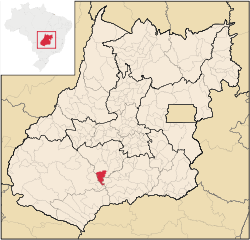Turvelândia
| Turvelândia | |
|---|---|
| Municipality | |
 Location in Goiás state | |
 Turvelândia Location in Brazil | |
| Coordinates: 17°51′33″S 50°17′22″W / 17.85917°S 50.28944°WCoordinates: 17°51′33″S 50°17′22″W / 17.85917°S 50.28944°W | |
| Country |
|
| Region | Central-West Region |
| State | Goiás |
| Microregion | Vale do Rio dos Bois |
| Area | |
| • Total | 934.2 km2 (360.7 sq mi) |
| Elevation | 459 m (1,506 ft) |
| Population (2007) | |
| • Total | 3,852 |
| • Density | 4.1/km2 (11/sq mi) |
| Time zone | BRT/BRST (UTC-3/-2) |
| Postal code | 75970-000 |
Turvelândia is a municipality in eastern Goiás state, Brazil.
Location
Turvelândia is located 65 km. east of Rio Verde
- Highway connections from Goiânia are made by state highway BR-060 west from Goiânia, through / Abadia de Goiás / Guapó / Indiara / Acreúna/ GO-164 / Santa Helena de Goiás / BR-452 / GO-409 / Maurilândia.
Neighboring municipalities: Acreúna, Edéia, Santa Helena de Goiás, Maurilândia
Political Information
- Mayor: Eduardo Mendonça (January 2005)
- City council: 09 members
- Eligible voters: 3,348 (December/2007)
Demographic Information
- Population density: 4.1 inhab/km² (2007)
- Urban population: 2,865 (2007)
- Rural population: 987 (2007)
- Population growth: a loss of about 1,800 people since 1991
Economic Information
The economy is based on subsistence agriculture, cattle raising, services, public administration, and small transformation industries.
Public administration provided jobs for 238 workers in 2003.
- Industrial units: 3 (2007)
- Commercial units: 32 (2007)
- Destillary: Vale do Verdão S/A (2007)
- Motor vehicles: 233 (2007), which gave a ratio of 16 inhabitants for each motor vehicle
- Cattle herd: 45,000 head (3,600 milk cows) (2006)
- Main crops: cotton, rice, sugarcane (11,200 hectares), manioc, corn (3,000 hectares), sorghum, and soybeans (14,000 hectares).
Education (2006)
- Schools: 4 with 1,075 students
- Higher education: none
- Adult literacy rate: 79.6% (2000) (national average was 86.4%)
Health (2007)
- Hospitals: 1
- Hospital beds: 13
- Ambulatory clinics: 3
- Infant mortality rate: 38.71 (2000) (national average was 33.0)
Municipal Human Development Index
- MHDI: 0.685
- State ranking: 220 (out of 242 municipalities in 2000)
- National ranking: 3,223 (out of 5,507 municipalities in 2000)
Data are from 2000
For the complete list see Frigoletto.com
See also
References
This article is issued from Wikipedia - version of the 5/25/2016. The text is available under the Creative Commons Attribution/Share Alike but additional terms may apply for the media files.

